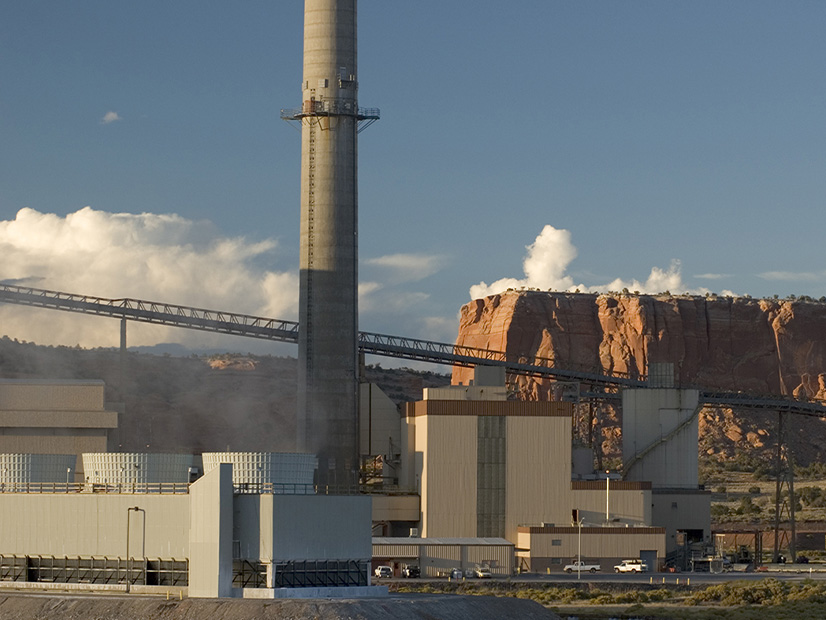
Conversion of the Escalante Generating Station into a hydrogen-fueled power plant would help support continued decarbonization of New Mexico’s electric system, a project proponent told state lawmakers recently.
“When you’re adding solar and wind … you need other resources, other decarbonized resources and clean resources that can help balance that out,” said Justin Campbell, vice president of power and transmission for Tallgrass Energy. “You need that so that the grid is still reliable and power is still affordable. That’s the role that this facility can serve.”
Campbell spoke during a meeting last month of the New Mexico Legislative Finance Committee. The committee spent a half day discussing progress in the state’s efforts to develop a hydrogen economy.
Tallgrass has a majority stake in a company called Escalante H2 Power (EH2), which wants to convert the Escalante Generating Station into a hydrogen-fueled plant. Escalante’s operator, Tri-State Generation and Transmission Association, shut down the 253 MW coal-powered plant in 2020.
EH2 plans to produce hydrogen at the Escalante site through reformation of methane from natural gas. Campbell said 97% or more of the CO2 produced in the process would be captured and stored, resulting in so-called blue hydrogen. The CO2 will not be used for enhanced oil recovery, he added.
Escalante is expected to provide about 265 MW of dispatchable power from hydrogen. Campbell said the hydrogen could also potentially be used in industry or for long-haul trucking.
EH2 is still analyzing the market for clean hydrogen in New Mexico, studying geological CO2 sequestration and looking for the best way to retrofit the Escalante facility, according to a report prepared for the Legislative Finance Committee by one of its analysts.
EH2 plans to eventually switch from blue hydrogen to green hydrogen, produced through the electrolysis of water using clean energy, the report said.
Hydrogen in Aviation
In addition to EH2, other hydrogen-focused businesses are setting up shop in New Mexico, said Alicia Keyes, cabinet secretary for the state’s Economic Development Department.
Universal Hydrogen, a company whose goal is to decarbonize aviation, announced in March that it would build a manufacturing hub in Albuquerque. One of the company’s projects is to develop powertrain conversion kits to allow existing regional turboprop aircraft to fly using hydrogen fuel.
BayoTech, a company that offers hydrogen production, transport, storage and fueling services, is headquartered in Albuquerque. The company’s model is to produce hydrogen at a smaller scale at local hydrogen hubs.
In December, the company announced an agreement to provide hydrogen to New Mexico Gas Co. from a hydrogen hub installed on the gas company’s property. In addition, BayoTech is working with San Juan College on a graduate-level program to train workers on hydrogen production systems.
“Obviously, what is going on here and with Escalante is going to be transformative for this area,” Keyes said.
Four-state Partnership
The business developments come as New Mexico is working with three other states — Colorado, Wyoming and Utah — to vie for a portion of $8 billion in federal hydrogen hub funding. (See Mountain States Partner to Secure Hydrogen Hub.)
Since the partnership was announced in February, the states have assembled an executive committee and working groups for the project and are developing a legal entity that would accept the funds if awarded, New Mexico State University Chancellor Dan Arvizu told the Legislative Finance Committee. New Mexico State is part of a team working on hydrogen hub strategies.
DOE last month released a notice of intent to issue a funding opportunity announcement (FOA) for hydrogen hub funding, with release of the FOA expected in September or October. (See DOE Hydrogen HUB Funding Program Announced.)
“There’s a lot of adjacent industries that will be enabled by having a hydrogen economy that’s robust in our state,” said Arvizu, who formerly headed the National Renewable Energy Laboratory.
Additional infrastructure will be needed, for transmission in particular, for the state to take full advantage of a hydrogen economy, Arvizu said.
Executive Order on Hydrogen
State officials are also working to meet directives of an executive order that Gov. Michelle Lujan Grisham issued in March to launch a clean hydrogen development initiative.
The order directs the Economic Development Department to include hydrogen in the state’s key economic sectors and “support the development of clean and zero-carbon hydrogen production.”
The order also directs the state’s Environment Department and the Energy, Minerals and Natural Resources Department (EMNRD) to craft a proposal for including zero-carbon hydrogen electric generation facilities in the definition of “zero-carbon resources” as used in state law. The proposal would then be considered by the New Mexico Public Regulation Commission.
In addition, the executive order instructs EMNRD to make recommendations on the development of carbon sequestration.
The departments will also provide recommendations to the governor before the 2023 legislative session on how to support a hydrogen industry in the state.



